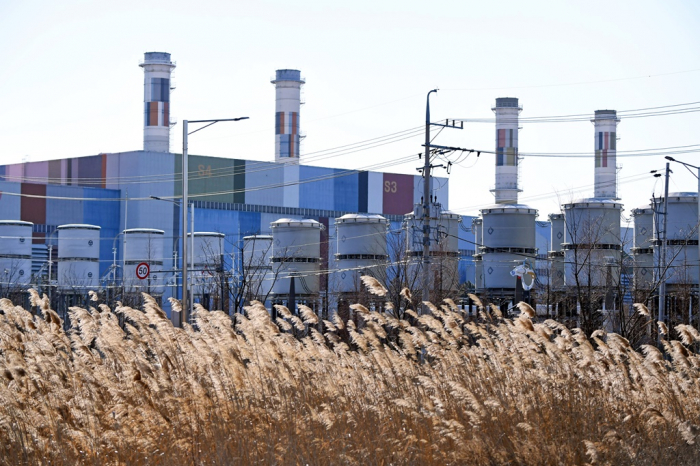Economy
Korea’s record trade deficit stirs capital outflow fears
Energy prices are expected to stay high, fiscal balance is predicted to report deficit for fourth year
By Feb 03, 2022 (Gmt+09:00)
3
Min read
Most Read
LG Chem to sell water filter business to Glenwood PE for $692 million


KT&G eyes overseas M&A after rejecting activist fund's offer


Kyobo Life poised to buy Japan’s SBI Group-owned savings bank


StockX in merger talks with Naver’s online reseller Kream


Meritz backs half of ex-manager’s $210 mn hedge fund



South Korea reported the largest trade deficit on surging raw material prices in January, string worries that capital outflows from Asia’s fourth-largest economy may accelerate.
The country logged a record trade shortfall of $4.9 billion last month as imports soared 35.5% to $60.2 billion from a year earlier, Ministry of Trade, Industry and Energy data showed on Tuesday. Exports expanded 15.2%, the slowest pace since February 2021, on-year to $55.3 billion.
Jumping raw material prices drove up import bills. The Middle East crude benchmark Dubai prices jumped 51.8% to $83.2 a barrel last month from a year earlier, while liquefied natural gas surged 337.8% and coal soared 153.8%.
As a result, imports of three key energy resources – crude, gas and coal – more than doubled to $16 billion from $6.9 billion.
South Korea’s monthly trade balance
Unit: $ billion
Graphics by Jerry Lee
Source: MOTIE
ENERGY PRICES TO STAY HIGH
Raw materials prices are unlikely to stabilize in the near term on strong global demand and rising inflation expectations. Tensions between Russia and Ukraine escalated, putting further upward pressures on the prices.
“Global oil prices were significantly rising due to geopolitical tensions,” said First Vice Finance Minister Lee Eog-weon on Jan. 28.
South Korea may see a trade deficit for this year, for the first time since 2008 when the country suffered from the global financial crisis, some feared. Its trade surplus has been dwindling to $29.4 billion last year from $70.4 billion in 2018.
A deficit could hurt its sovereign credit ratings and drive foreign investors out of the country.
“We will work with related ministries and agencies to make trade balance turn into surplus as soon as possible,” said trade minister Moon Sung-wook to ease such worries.
TWIN DEFICITS?
South Korea’s economy has been supported by a sustained trade surplus backed by strong exports, as well as a solid fiscal balance that attracted foreign investors. But some were concerned over potential twin deficits – fiscal and current account shortfalls – this year as the country may see a current account deficit for the first time since 1997 during the Asian financial crisis if a trade account keeps staying in the red.
The country is already expected to report a budget deficit in 2022 for a fourth straight year as the government provided financial support to people and businesses hit by the COVID-19.
A fiscal deficit this year is forecast to more than triple to 68.1 trillion won ($56.5 billion) from 22 trillion won in 2021. The debt-to-gross domestic product (GDP) ratio will rise to 50.1% in 2022 from 35.9% in 2018.
The prospect shortfall came as the government proposed a supplementary budget of 14 trillion won in January to support small companies and the self-employed, about a month after the parliament approved a record 607.7 trillion won spending for this year.
PORK-BARREL POLICIES
In addition, presidential candidates from both ruling and opposition parties insisted on a significant increase of the COVID-19 financial supports and pledged various pork-barrel policies, stoking fears that a fiscal deficit may grow to 100 trillion won.

The country is already estimated to have suffered twin deficits in January as the government provided financial aid to help the pandemic-hit sectors from the beginning of the year. It logged a budget deficit of 1.7 trillion won in January 2020 and 1.8 trillion won in January 2021.
It last reported monthly twin deficits in April 2020 when the government spending surged on financial supports to ease the impact of the COVID-19 and foreign investors repatriated dividends from local companies.
Twin deficits are predicted to accelerate capital outflows. Foreigners have been already pulling money out of the nation as the US Federal Reserve suggested a March rate hike. Foreign investors dumped a total of 4.1 trillion won worth of stocks on the main Kospi during a seventh consecutive session to Jan. 28, according to the Korea Exchange.
The economy is feared to slow down again if the deficits undermine consumption that is expected to come under further pressure if the spread of the Omicron variant delays the economic reopening.
Write to Eui-Jin Jeong, Ik-Hwan Kim and Jin-gyu Kang at justin@hankyung.com
Jongwoo Cheon edited this article.
More to Read
-
 War in UkraineKorea swings to trade surplus in Feb; Russia risks loom
War in UkraineKorea swings to trade surplus in Feb; Russia risks loomMar 02, 2022 (Gmt+09:00)
2 Min read -
 War in UkrainePerfect storm from Ukraine crisis clouds Korea Inc.’s outlook
War in UkrainePerfect storm from Ukraine crisis clouds Korea Inc.’s outlookFeb 25, 2022 (Gmt+09:00)
4 Min read -
 War in UkraineS.Korea to support firms to offset damage of Ukraine crisis
War in UkraineS.Korea to support firms to offset damage of Ukraine crisisFeb 25, 2022 (Gmt+09:00)
2 Min read -
 EconomyBOK sees inflation at 11-year high as oil tops $100 on Ukraine crisis
EconomyBOK sees inflation at 11-year high as oil tops $100 on Ukraine crisisFeb 24, 2022 (Gmt+09:00)
3 Min read -

-

Comment 0
LOG IN


